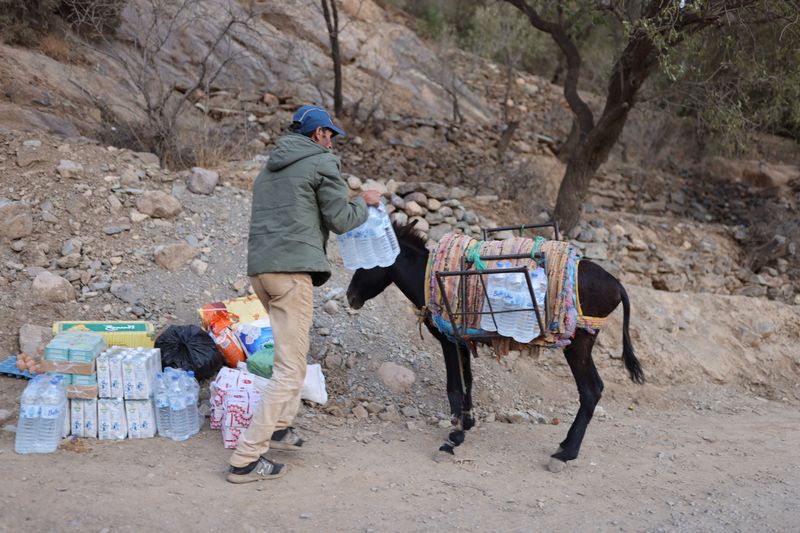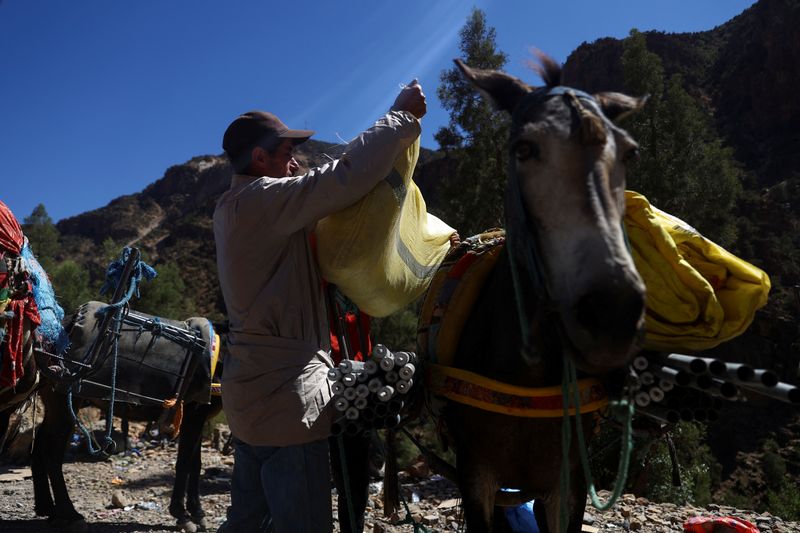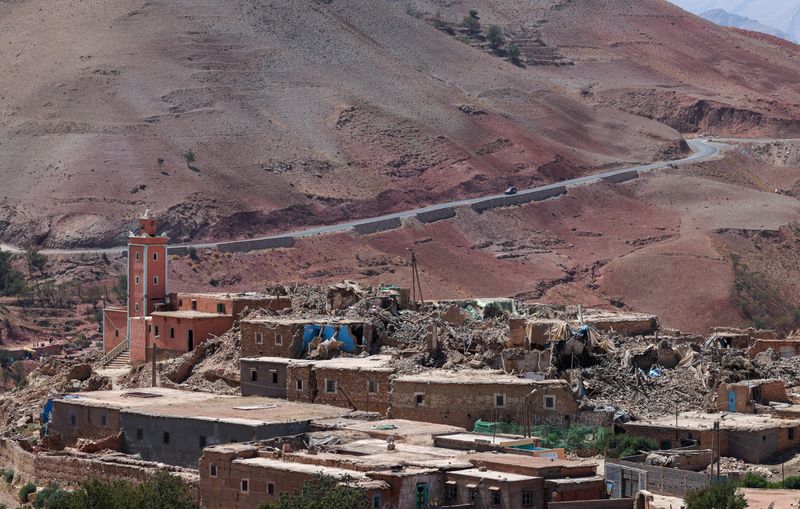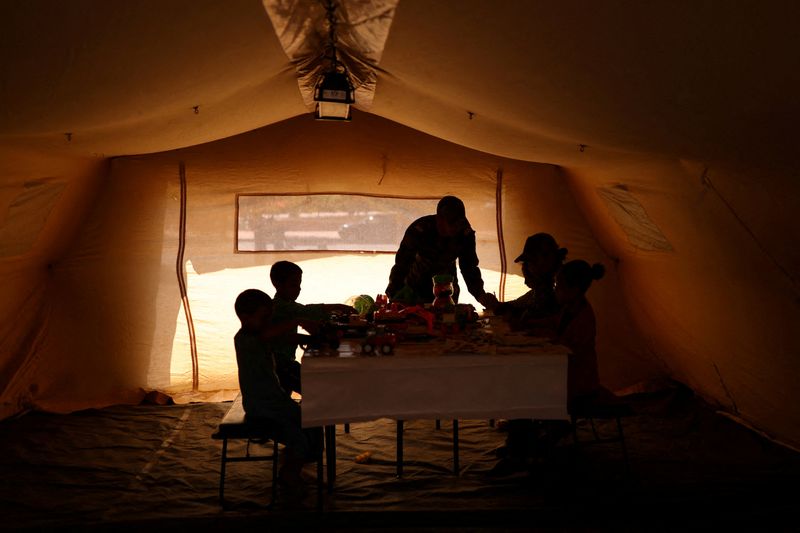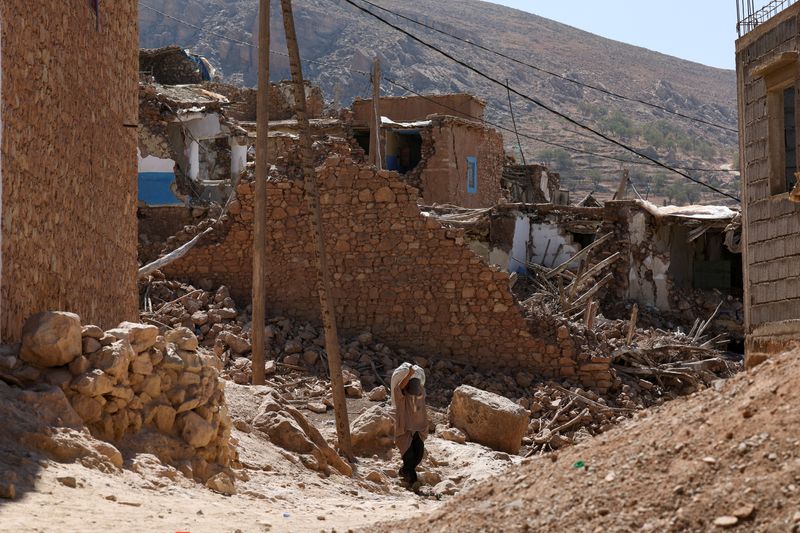By Alexander Cornwell, Ahmed Eljechtimi
OUTSIDE AGNDIZ, Morocco (Reuters) -With many roads still blocked by landslides, some Moroccan villagers on Wednesday loaded donkeys with supplies to take to remote areas inaccessible by vehicle, as some earthquake survivors’ frustration mounted at the pace of official response.
The 6.8 magnitude quake that struck the High Atlas Mountains late on Friday killed at least 2,901 people and injured 5,530, according to the latest official figures, making it Morocco’s deadliest since 1960 and most powerful since at least 1900.
At a roadside, Iydouhmad Mohamed, 42, from the remote High Atlas village of Agndiz, sorted through bundles of relief supplies for his village 12 km (8 miles) away, which could only be reached by donkey. No government officials had reached it yet, he said, days since the quake.
“Many people died in my village. Some families have lost 15 relatives. Others 12 or 7,” he said.
“We especially need tents. What we have is not enough. People including children are sleeping out in the open air only covered with blankets.”
Ordinary Moroccans have brought and delivered many of the supplies reaching mountain villages. The steep, rugged terrain and damaged roads have made the official response patchy, with some of the worst-hit hamlets the last to receive help. Field hospitals and shelters have been set up in more accessible sites.
Abdallah Houssein, 40, from the High Atlas village of Zawiyate said, “There is no road here. No one can remove the boulders which collapsed from the mountain.”
“This is the sixth day after the earthquake. We are still sleeping out in the open air with our children. We have no blankets,” he said. As he also packed donkeys, he said they could only make the journey to his village twice a day.
With many survivors voicing frustration at what they see as the government’s slow emergency response, King Mohammed on Tuesday made his first televised appearance since the quake, meeting injured people at a hospital in Marrakech.
Reuters reporters said there was a noticeable increase on Wednesday in the number of troops, police and relief workers near the epicentre. Tent camps were being set up or expanded, field hospitals were busy and helicopters flew overhead.
Medics treated broken bones, cuts and trauma injuries from falling buildings as well as assisting people with chronic conditions such as diabetes, with medical supplies scarce.
FAMILIES WIPED OUT
In the village of Outaghrri, which was almost entirely flattened and where four people were killed, homeless survivors have spent the five nights since the quake sleeping outside in the school yard, one of few spaces not covered in rubble.
“It’s really hard. It’s cold,” said Said Ait Hssaine, 27. He said survivors were fearful of aftershocks and struggling to come to terms with the deaths and destruction.
“We keep everything inside. You know people here are a little bit hard and they cannot show they are weak or they can cry, but inside you just want to go somewhere and cry,” he said.
The village had just received a consignment of government-issued tents but they were not waterproof, a serious concern.
“Life was difficult here even when people lived in their houses. It snows here. Tents will not solve the problem,” said Ouazzo Naima, 60, who lost eight relatives in the quake.
In Talat N’Yaaqoub, a small town that suffered extensive damage but has also turned into an aid hub, patients were being treated in the back of ambulances parked in a long row alongside a tent camp for survivors.
In the same town, 19-year-old student Imane ait Said looked over the rubble of her house after returning from the city of Fez where she was studying. She lost 10 family members in the quake, including her brother.
“All my memories are here, my family, my friends, neighbours. Everyone died and lost their houses in this area,” she said.
“My brother was a very kind boy, all the neighbours knew him and cried over him when he died because whenever anyone asked him for something or do them a favour, he never refused… He did well at school – he just passed the second year of secondary school this year.”
(Additional reporting by Janis Laizans and Emilie Madi; Writing by Estelle Shirbon and Alexandra Hudson; Editing by Alison Williams, Angus MacSwan and David Gregorio)
